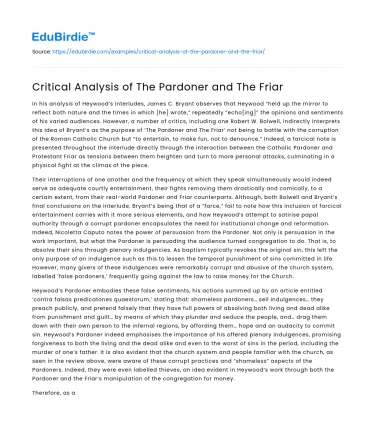In his analysis of Heywood’s interludes, James C. Bryant observes that Heywood “held up the mirror to reflect both nature and the times in which [he] wrote,” repeatedly “echo[ing]” the opinions and sentiments of his varied audiences. However, a number of critics, including one Robert W. Bolwell, indirectly interprets this idea of Bryant’s as the purpose of ‘The Pardoner and The Friar’ not being to battle with the corruption of the Roman Catholic Church but “to entertain, to make fun, not to denounce.” Indeed, a farcical note is presented throughout the interlude directly through the interaction between the Catholic Pardoner and Protestant Friar as tensions between them heighten and turn to more personal attacks, culminating in a physical fight at the climax of the piece.
Their interruptions of one another and the frequency at which they speak simultaneously would indeed serve as adequate courtly entertainment, their fights removing them drastically and comically, to a certain extent, from their real-world Pardoner and Friar counterparts. Although, both Bolwell and Bryant’s final conclusions on the interlude, Bryant’s being that of a “farce,” fail to note how this inclusion of farcical entertainment carries with it more serious elements, and how Heywood’s attempt to satirise papal authority through a corrupt pardoner encapsulates the need for institutional change and reformation. Indeed, Nicoletta Caputo notes the power of persuasion from the Pardoner. Not only is persuasion in the work important, but what the Pardoner is persuading the audience turned congregation to do. That is, to absolve their sins through plenary indulgencies. As baptism typically revokes the original sin, this left the only purpose of an indulgence such as this to lessen the temporal punishment of sins committed in life. However, many givers of these indulgences were remarkably corrupt and abusive of the church system, labelled ‘false pardoners,’ frequently going against the law to raise money for the Church.
Save your time!
We can take care of your essay
- Proper editing and formatting
- Free revision, title page, and bibliography
- Flexible prices and money-back guarantee
Heywood’s Pardoner embodies these false sentiments, his actions summed up by an article entitled ‘contra falsas predicatones quaestorum,’ stating that: shameless pardoners… sell Indulgences… they preach publicly, and pretend falsely that they have full powers of absolving both living and dead alike from punishment and guilt… by means of which they plunder and seduce the people, and… drag them down with their own person to the infernal regions, by affording them… hope and an audacity to commit sin. Heywood’s Pardoner indeed emphasises the importance of his offered plenary indulgences, promising forgiveness to both the living and the dead alike and even to the worst of sins in the period, including the murder of one’s father. It is also evident that the church system and people familiar with the church, as seen in the review above, were aware of these corrupt practices and “shameless” aspects of the Pardoners. Indeed, they were even labelled thieves, an idea evident in Heywood’s work through both the Pardoner and the Friar’s manipulation of the congregation for money.
Therefore, as a Catholic himself, Heywood criticises not religious faith but the corruption and ineptitude of the Roman Catholic Church as an institution, condemning the Pardoner and corrupt doctrine for manipulating money from the people in exchange for entrance into heaven. However, Heywood’s interludes were not the only Renaissance text concerned with guilt and divine punishment. Shakespeare’s King Henry VIII takes place on the cusp of Henry VIII’s split with the Roman Catholic Church and uses the characters of Katherine and Buckingham to deal with this idea of heaven and hell. Here Shakespeare steps away from the fundamental debate between Protestants and Catholics and explores, as Mary P. Nichols suggests, “a larger moral – and Christian – vision.” Indeed, Katherine, when presented with Henry VIII’s divorce, keeps her charitable level-headedness as she is continually dishonoured, and against Cardinal Wolsey keeps her moral judgement. She laments that Christ will know of Wolsey’s deceit, as they 'have angels' faces, but heaven knows your hearts.” Even amongst the height of the manipulation at Henry’s court Katherine refuses to lower herself to corruption. Henry, as he goes ahead with the divorce, notes Katherine’s modesty: “Sovereign and pious else, could speak thee out/ The queen of earthly queens. She’s noble born.” Although, there are instances where Shakespeare in fact does engage with the prominent Protestant-Catholic debate of the period, despite the play being written long after England’s Reformation and Elizabeth I’s coronation. Therefore, the play can be seen as a foreshadowing of future events.






 Stuck on your essay?
Stuck on your essay?

